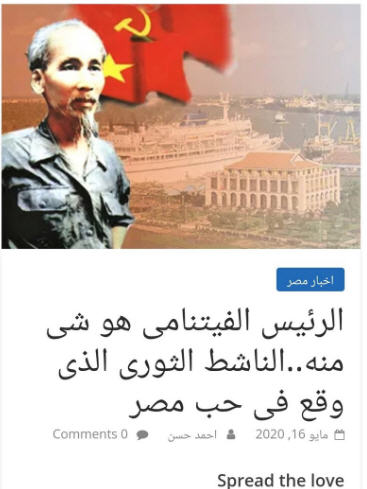
Egyptian newspaper on May 16th published Uncle Ho’s picture on an article marking his 130th birthday.
Among the books are “Ho Chi Minh: Bringer of Light”, or Ho Chi Minh: La figure de l'indépendanceretrouvée du Vietnam (Ho Chi Minh: Character regains independence for Vietnam), written in the French language. Of which, the first one brings together 61 articles by over 60 domestic and foreign authors praising Uncle Ho's life and career in the struggle for national independence. The authors are journalists, scholars, historians, politicians and economists who met, worked with and learned about President Ho Chi Minh during his life.
Describing the young man Nguyen Ai Quoc from 1919 to 1923, Vietnamese-French historian Pierre Brocheux wrote in the book that Nguyen Ai Quoc showed qualities and talents that were recognized by many others. He was not dogmatic. His humor and sensitivity made a deep impression in the memories of those who knew him in the 1920s. It also attracted people close to him or those who met him in daily life.
The book Ho Chi Minh: Character regains independence for Vietnam, published by France’s Le Monde in 2015, reviewed the activities of young man Nguyen Ai Quoc from the Tours Congress in 1920 and became one of the founders of the French Communist Party. The book praises his influence in the widespread gathering of people of all generations to successfully win the August Revolution, while also emphasizing his famous saying: "Nothing is more precious than independence and freedom".
In an article on Time, the leading US magazine that 5 times placed the portrait of President Ho Chi Minh on its cover, journalist Stanley Karnov wrote that with a slim body, thin beard, worn coat and worn-out rubber sandals, President Ho Chi Minh was considered humble and friendly. He was an enthusiastic and sincere senior revolutionary patriot, always fighting for his ultimate goal which is independence for the country. He commented that in the eyes of the West, they cannot imagine the great sacrifices President Ho Chi Minh made.
Time magazine also quoted Indian revolutionary activist Jawaharlal Nehru describing President Ho Chi Minh as an extremely likable and friendly person, one who is only in pain for the sake of peace. Speaking about President Ho Chi Minh, late Chilean President SanvadoAgiende emphasized that he was a living image of revolutionary morality, with a special feature of humility, simplicity and sincerity. He said that if someone wanted to find words that can sum up President Ho Chi Minh's life, it would be the phrase "very simple and extremely humble".
President Ho Chi Minh left many good impressions on those who met him. In Hanoi in early 1967, Harry Ashmore, former editor of the Arkansas Gazette who had the opportunity to meet him, described that Mr. Ho was a gentleman. The journalist also recalled that the meeting surprised him with President Ho's English communication skills. However, after learning more about him, the American journalist acknowledged that English was just one of many foreign languages he mastered, including Chinese, French, German and Russian. A French naval commander, after meeting with President Ho Chi Minh for 3 weeks, concluded that he was an intelligent, charismatic leader, an enthusiastic idealist devoted to the career he pursued.
On the occasion of President Ho Chi Minh’s 130th birthday, Egyptian journalist Ahmed Hassan wrote an article published on two online newspapers, Event Magazine and Knowledge of Progress on May 16th, that praised President Ho Chi Minh and Vietnam. In his article entitled President Ho Chi Minh and the country of the Pyramid, the author expressed his affection and admiration for the great President Ho Chi Minh, the preeminent leader of Vietnam, who had geat influence on the movement of national liberation of oppressed peoples around the world./.
Compiled by BTA